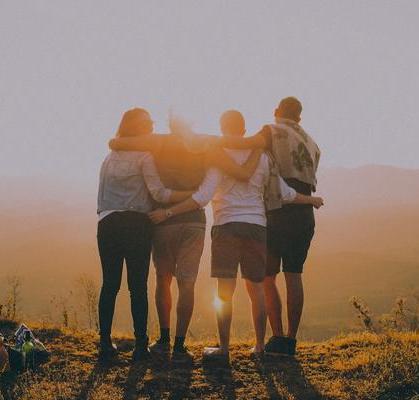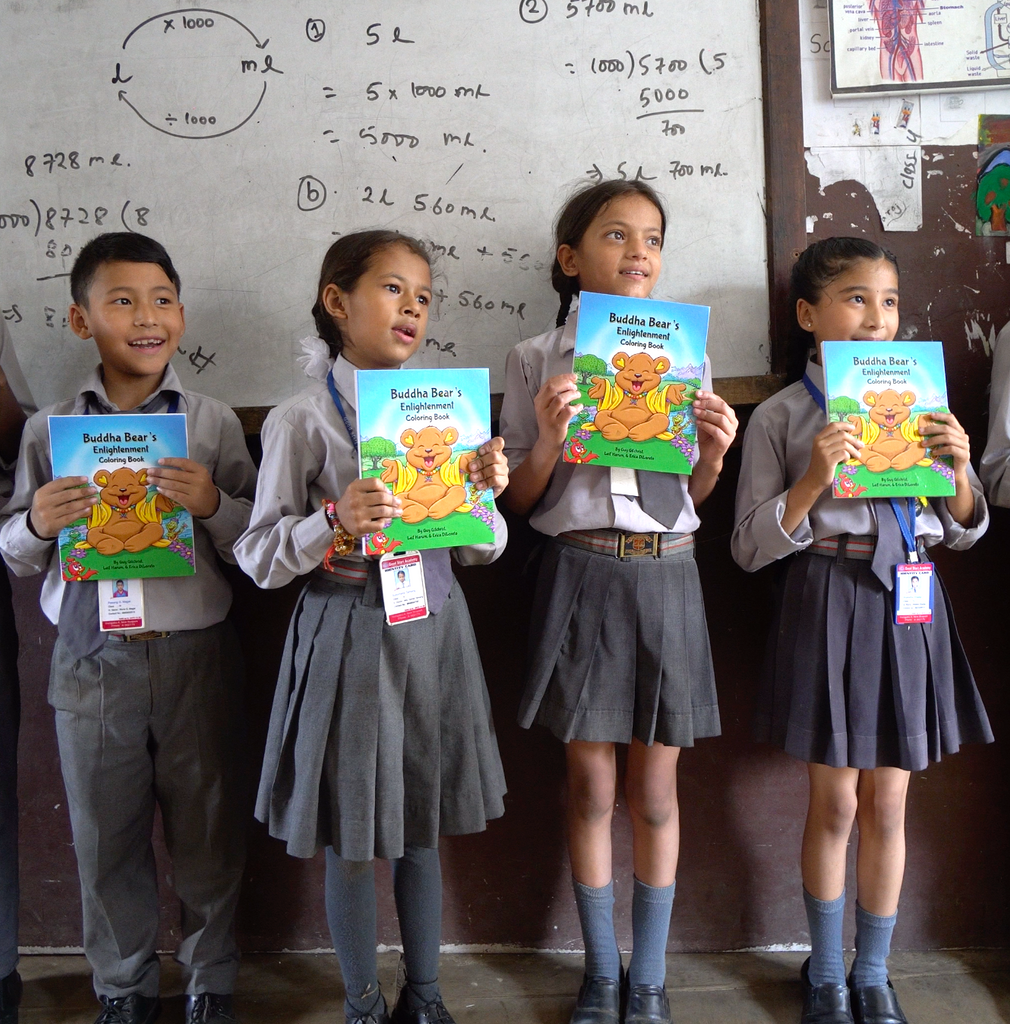Enlightenment Blog

9 Reasons to Talk Strangers (Especially While Traveling)
 Although many of us are strictly taught not to talk to strangers as kids, this message can hold us back from new possibilities as adults. Other people are our pathway into new opportunities, loving relationships, friendships, or pointers in a certain direction that can change the course of our entire lives.
Although many of us are strictly taught not to talk to strangers as kids, this message can hold us back from new possibilities as adults. Other people are our pathway into new opportunities, loving relationships, friendships, or pointers in a certain direction that can change the course of our entire lives.
There is even more beauty in connecting with strangers while traveling. The connection with new people from walks of life different than your own, can change the way we see the world. When you get a feeling for the people of a faraway place, you experience the heart and soul there.
However, it can feel scary and vulnerable to talk and interact with people who we are not familiar with and who are not familiar with us, especially if they’re of a very different culture or language. Still, contact with people we’ve never met, can make life more interesting and rich, for the reasons listed below.
Here’s why talking to strangers is a brilliant idea, especially when you’re traveling.
You Will Gain a New Understanding of Life
New people and fresh perspectives are healthy for our minds. We can learn something from everyone. Every single individual is comprised by the unique experiences and stories of their lives. When we’re uninspired and feel like we’re going through the motions in life, connecting to a new person, can create a shift and unlock another world of possibilities. This is even more so, if that new person comes from a place or culture different than yours.
Language barriers are less than they used to be because of technology
It’s easier to talk to strangers anywhere now. It doesn’t matter if you’re on the other side of the world, technology is making it possible to have conversations between two or more people who don’t speak the same language, through translation apps. It’s a remarkable feeling to have a genuine connection with someone who speaks no more than a few words of your language. I recently went on a trip through Japan and had some genuine and heartwarming meals and interactions with new friends who didn’t speak more than a few works of English (and I don’t speak Japanese). We sat, shared food, and even laughs, while taking turns typing messages back and forth to each other. I got a much deeper feel for the country’s people from talking to strangers there, even when language barriers could have made it tough, and would have made it impossible just a few years earlier.
Social media doesn’t count for genuine human interaction
While it might feel like we’re interacting all the time with others via social media, there’s nothing more powerful than the real thing and in-person interaction. In many ways, the internet is bringing us closer together, but in other ways, it’s separating us more. Genuine human connection via social media is sometimes an illusion. In many ways, digital contact is a shield, to real vulnerable connection. It can also be a filter, where we portray unrealistic expectations of who others are and how our lives should be. It’s useful is so many ways, like keeping in touch with friends from faraway, sharing ideas, and countless others. However, digital connection does not replace the benefits of in-person connection, especially with people from other walks of life. So yes, keep making new friends online, but don’t forget to meet new ones in person too!
You might find your lover (or temporary lover)
Yes, the internet is a good resource for love, but instant attraction also happens in person. Those moments when we feel a spark for another human sitting across the room might come and go, but the good sparks that make us brave enough to say something, can lead to magical connections. Some may be brief, some passionate, and others long-lasting, but approaching someone because of physical and energetic attraction takes bravery. The results can be satisfying and life changing, anywhere in the world. In the case of romance, talking to strangers can be something you are so grateful you did, instead of feeling regret you did not.
You could make another person’s day (or even save their life)
Wherever you are in the world, you never know what talking to a stranger could do for the other person. Too many of us feel alone and isolated and taking the time to talk to someone could make their day. It could also save their life. In a 2014 study by the University of Michigan, it was revealed those who felt socially isolated were far more likely to suffer from a heart attack, than those who were not. Furthermore, those who interacted with new people and made new friends, were happier. “Chance encounters with strangers do more than stave off disease and disorder. Forging friendships out of thin air — that skill reserved for the first day of kindergarten and college orientation — can actually make you happier.” There are other reports of a conversation with a stranger being a major factor in someone changing their mind about committing suicide. So, by talking to strangers, whether at home or abroad, you could not only be helping yourself, you could also be helping the other person.
It reminds us people are inherently good in the world
If you tune into the news too much it can be easy to feel like the world is a scary and dangerous place and people cannot be trusted. If you talk to people regularly instead, it’s hard not to feel that people are good at their truest essence. While some places in the world may be plagued with negative news stories and focus, it’s usually a very different experience to go there and talk to the people there. Geography and media can keep us separate, but a simple conversation can bring to light that most people want to be happy in life, regardless of what country they are from. Talking to people of other cultures, can remind us that although there are differences, there are kind hearts everywhere in the world.
You’ll Become More Confident
When you have the courage to talk to strangers, you’ll feel more confident yourself. This is especially true for those of us who feel shy. Approaching someone you don’t know can feel daunting. However, just doing it, and starting a conversation with a stranger, like doing anything outside of your comfort zone, makes you more confident to keep pushing your boundaries and putting yourself out there. For many, social interaction can be among the most anxiety producing parts of life and the best way to overcome this, is to actually interact more! When we stop letting fear dictate our actions (or inaction), we become braver and more confident versions of ourselves. This can be especially nerve-wracking in foreign countries, where we might not speak the language! However, the benefits of finding this courage can lead to some unforgettable adventures.
It Can Make For An Awesome Story
You never know who you’ll meet, what they’ll tell you, or where a connection with a stranger can lead you. It’s harder to have good stories to tell when you’re with the same people all the time in the same place. Whether it’s an epic night out, a new lover, a pointer to a place that makes your day, or finding yourself in some bizarre situations, life will generally be more interesting when you put yourself out there more and talk to new people. Plus, we all love a good story to share with our friends. I’ve met characters and heard stories I’ve never forgotten while traveling, because I began talking to new people (or they started talking to me).
You’ll Discover the Best Parts of a New Place
While the internet is useful for letting us know good places to eat and sightsee in a new city, there is nothing quite as good as word of mouth recommendation from a local. Whether it’s discovering a nice park, a place to eat, or places to go dancing, locals know best. To get these insider tips, you must talk to locals! Asking strangers about things to check out in their city can also be among the easiest ways to break the ice with a stranger! Next time you’re somewhere new, rely on the internet less, and talk to strangers more.

How to Create & Maintain Mindful Friendships
In my life coaching practice, I’ve noticed a common theme.
“It’s hard to make new friends,” my clients say. “Everyone’s already got their circle of friends, and they don’t want any new ones.”
“Is that true?” I ask. “You want to add new friends. Is it possible that there are any others who feel the same way, and might welcome your friendship?”
“Yeah, but…” they begin.
I stop them right there.
Some of the most painful and untrue stories we tell ourselves begin with “yeah, but,” so I strongly discourage such storytelling.
“Let’s take a mindful approach and focus on the possibilities that just arose in this moment,” I reply. “Let’s dig down and find what’s true.”
Here’s what we usually discover:
-If they find themselves wanting to make new friends, it’s possible that the ones they have are not satisfying a longing to be seen and heard and understood.
-It’s possible that they’ve maintained a number of legacy friendships that have been around for a long time, but haven’t grown.
-Some of their friendships exist out of loyalty rather than a feeling of true connection or intimacy.
-Some friendships feel like work, not play.
-Some of their friends are happy to hear from them when they call, but don’t reach out or include them in their social plans.
Here’s the good news: there are many kindred spirits out here, right now, who are creating or re-creating friendships that are delightful, open-hearted, inclusive and inspiring.

Mindfulness practices can help you attract friends who support and celebrate the choices you make, who accept you without judgment, and who are straight with you about their emotional responses to the actions or behaviors that affect them.
Paying mindful attention to what’s important will lead you to connect with people who are clear about what lights them up, and who encourage you to shine, too.
Taking a mindful approach to friendship means focusing your attention on becoming the kind of friend you’re looking for.
We all want friends who can meet us where we are, hold space for us to be who we are (not who they want us to be), and can accompany us as equals on the journeys of our lives. So we have to ask ourselves, “Can I be that kind of friend?”
Mindfulness asks us to take full responsibility for the process, without shame, blame or creation of a narrative about how hard or scary it is.
Rejection is a common story. Mindfulness reduces the risk of feeling rejected once we understand that not everyone is meant to be by our side. When we can detach from thoughts of wanting a particular person to like us, and focus instead on becoming a person we, ourselves, actually like, the issue resolves itself.
As the spiritual teacher Ram Dass wrote, “We’re all just walking each other home.” Mindful friendships hold enough space for us to walk together. They have no agenda, are free of judgment, and allow us to simply be with whatever is present, making it safe for us to be our authentic selves.
Mindful friends know how exactly to hold space for us. They support us, inspire us, and challenge us to grow.
Here’s how to become the kind of friend you want to attract:
-
Write out, in detail, what you most long for in a friend. What characteristics does your dearest future-friend have? What are they like? What do they do for you? What would they never do?
(I highly recommend the Backpack Buddha blank journals for this: Buddhist Lokta Paper Journal, Prayer Flag Journal and Buddha’s Vision Journal—all are made of Lokta bark paper, which lends a deep spiritual dignity to your musings. The unique texture will inspire you to articulate your inner journey with your whole heart, and each page contains a sacred energy that only this paper, handmade by craftspeople in from Nepal, can impart. )
-
Healthy friendships have healthy boundaries. Remember to include those boundaries as you journal, and observe your own tendencies to set agendas, judge, or create narratives. Gently encourage yourself to explore what it would be like to let those go.
-
Practice demonstrating your desired friendship characteristics daily, by showing them inwardly, to yourself, as well as outwardly to others. When you understand what it takes to be the kind of friend you want to have, and can live that way first, your friendships will naturally fall into place.
-
When you meet someone who fits your description, you’ll recognize them at once. Be the first to open your heart and invite them in. Create a sense of ease around friendship.
- If you practice mindfulness meditation, consider wearing your mala off the cushion as well as on. I’ve been stopped on the street by other mindfulness practitioners when they recognize my 108-bead bracelets, and the conversations we have are, without exception, delightful and heart-centered.
Who knows? Maybe you’ll find a new friend. And it will be just that easy.

Buddha Bear’s Donation To The Students Of Kathmandu

We decided to get the ball rolling early. Before we sold even one copy, we headed to "Start Academy." Why this school among the hundreds in Kathmandu? It was Pratista's school, the 10 year old daughter of our Nepal country manager Param. With 163 notebooks and pencils in tow, enough for every student in the school, with presented them to the principle. He graciously adorned us with traditional Nepali welcoming scarfs.
The kids were screaming in excitement, the principle was grinning with appreciation, and we were overcome with the warmth you feel when you know you’re doing something genuinely good.
From the principles office, we headed to Pratista’s classroom. Admittedly, we were a little nervous. This was the first time that kids were going to interact with Buddha Bear’s Enlightenment Coloring Book. However, our nerves quickly dissipated. The students immediately and happily engaged with the story, the question of self reflection, and the coloring portion. Considering these Nepali kids were just 9 and 10 years old, we were more than impressed with their advanced level of English.
The day couldn’t have gone better. We made our first donation, the first of what we hope will be many. We introduced Buddha Bear's Enlightenment Coloring Book to some incredibly intelligent and special kids, and they loved it. Check out the video below to see how it all went down.
What Is Nepalese Lokta Paper & Why Is It So Special?

After a 10 minute taxi ride to the outskirts of Kathmandu, we arrived. It was the place where all the magic was happening. The place where our Enlightenment Journals and Buddha Bear coloring books were coming to life.
There weren’t any industrial sized printing machines in sight. Instead there was a huge stack of Lokta paper, and our team of around 10 people. It was our partner Sanu and his family, turning our creations into reality, and doing it all by hand.
The very first time we witnessed the Lokta paper publishing process we knew it was something special. Not only does the process support the livelihoods of craftsmen and women of this ancient art, but everything, from the ink, to the flour based glue, to the harvesting of the Lokta bark is completely sustainable and all natural. From then on we decided that Lokta paper would be the medium on which all Backpack Buddha creations would come into fruition.
What Is Lokta Paper?
For thousands of years, the people of the Himalayas have harvested the evergreen shrub known as the Lokta bush. Unlike standard paper, Lokta paper is insect and humidity resistant, allowing it to last up to 3000 years. In fact, the oldest surviving document printed on Lokta paper is the sacred Buddhist text, the Karanya Buhu Sutra, and it is believed to be close to 2000 years old.
How Is Lokta Paper Made?
Its fibrous bark is the key to the production of this unique paper. First, the bark is harvested from the bush. Then it is boiled into a pulp. It is poured onto a rectangular mold, and finally left in the sun to dry. Although the process, sounds simple, it is extremely time consuming and laborious.
Where Is Lokta Paper Made?
Lokta paper is primarily harvested by small rural villages in the Baglung district of Nepal. In recent years, these villages have relied solely on selling Lokta paper to support their livelihoods. This is one of the main reasons why all of our products are printed on Lokta paper.
Why Is Lokta Paper So Special?
From the village to the factory, Lokta production and final products are made in the same way they have been for thousands of years. When the paper arrives from the village it is pressed and cut to the desired size. Then it is dyed with all natural chemical free colors. The dyed paper is then laid under a stencil, an outline of what is to be printed. Natural ink is run over the stencil by hand, and the text or design is printed.
Is Lokta Paper Environmentally Friendly?
Every year, approximately 4 billion trees are cut down in order to supply the world with paper. Although we can replant these trees, they are being cut down faster than they can grow. The result, an exponential growth of global deforestation, subsequent loss of bio-diversity, and ultimately climate change.
On the other hand, Lokta paper is made from what is considered a non-wood forest product. When it’s bark is harvested, this high altitude evergreen shrub automatically regenerates in 5-7 years. It is one of the few under utilized species in the world. This makes Lokta paper an extremely eco-friendly alternative to typical wood based papers.

Visit Nepal!
At first they paid no attention to us, and continued to work. But as they saw our gratitude for the work they were doing, and our utter awe at the entire process, morale lifted. We told them of all the beautiful customer reviews about the quality of Enlightenment Journals, and Buddha Bear Coloring Books, and everyone seemed to smile at once. They felt proud, and we felt proud together.
To witness the process, from village to family run basement factory to final product, makes one feel as though they have traveled back in time. Nearly everything is done by hand. It is a beautiful process, and one that we at Backpack Buddha feel grateful to support. If you’re interested in coming to Nepal and learning process first hand, our Nepali partners have told us that it would be their pleasure to show you.
What Travel Taught Me About Happiness

Sometimes happiness feels so elusive. You could be on the most glorious beach witnessing the most awe-inspiring sunset and still feel like garbage.
After 15 years of traveling through over 80 countries, here’s a few realizations that the road has taught me about happiness. Realizations that I all too often forget.
Realization 1
We aren’t meant to be happy all the time. If we were, we wouldn’t even know the concept of happiness. If we constantly live under the impression that we need to be happy all the time, we’re constantly going to be disappointed when we’re not.
Realization 2
There’s no drug either natural or man made on earth that will make you happy. I totally know what some of you are thinking, “Weed makes me pretty darn happy.” I know, weed makes me happy too. But the problem is, when the weed wares off, you forget where you put your car keys, or in my case where I put my room key, and you forget where you put the happiness as well. You end up continuously relying on the drug to experience happiness. Is it true happiness?
Realization 3
If you’re not happy in one place, you’re not going to be happy in the next. This is not to say that the suite at the Hyatt won’t make you happy because it chances are it will. But that happiness is fleeting. After 4 days you’ll feel exactly the same as if you were staying at that dump next to the parking lot. Happiness comes from within and nothing in the external world can truly change it.
Realization 4
It’s a lot easier to be happy than it is to be sad. A lot of us struggle under the misconception that contentment is hard to attain. In truth, the hardest part about it, is thinking that it’s hard. It takes much more energy to think negative and keep yourself down than it does to think positive and enjoy happiness.
Conclusion
None of these ideas are revolutionary. They’re understandings that most all of us know. Unfortunately, they’re easy to forget. With the latest tech from Apple dangled on sticks in front of our screen glazed eyes, we equate happiness with the material. We get stuck in routines and form negative habits that become so ingrained that it’s difficult to see the light. That's why it is important to reflect often, and continue to strive towards greater understanding of ourselves and the true nature of our reality.
- 1
- 2



